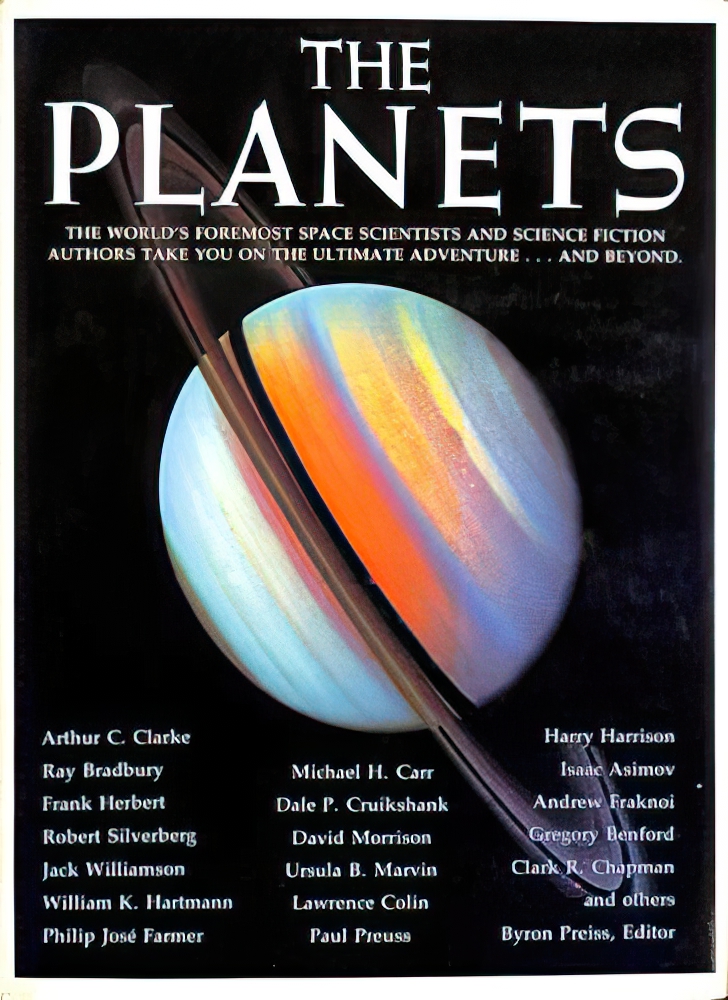 Story: The Planets is, quite simply, one of my all-time favorite books, a mind-boggling and impossible-to-pigeonhole anthology of scientific essays and short stories from some of the best science fiction authors on the planet. The Planets is a brilliant combination of facts, speculation, and artwork, each section of the book focusing on one of the planets in our solar system, as well as the asteroids, comets, and Earth’s moon, and how humankind could change it – or how it could change us.
Story: The Planets is, quite simply, one of my all-time favorite books, a mind-boggling and impossible-to-pigeonhole anthology of scientific essays and short stories from some of the best science fiction authors on the planet. The Planets is a brilliant combination of facts, speculation, and artwork, each section of the book focusing on one of the planets in our solar system, as well as the asteroids, comets, and Earth’s moon, and how humankind could change it – or how it could change us.
Review: Though it’s most likely out of print now, this book is one of my most prized literary possessions. Smartly-written factual essays combined with mold-breaking science fiction short stories made for a book whose contents have challenged and awed me since my early teens. (Somehow, the follow-up book, The Stars, edited in much the same staggered science/science fiction format, didn’t thrill me as much.)
Curiously, the book starts not with Mercury, but with Earth. The short story here is by Harry (The Stainless Steel Rat) Harrison, and it’s a brilliant socio-political piece on political borders and divided cultures, with an unexpected twist at the end. Ray Bradbury contributes another chapter of “The Martian Chronicles” for the piece on Mars, and Gregory Benford paints a sprawling, epic future of human colonization of Jupiter and its moons. But the Saturn and Uranus sections contain some of my favorite material, with Roger Zelazny’s “Dreadsong”, a story about trying to determine whether or not strange signals discovered by a researcher could indicate sentient life on Saturn, and two stories for Uranus, Philip Josè Farmer’s whimsical “UFO vs. IRS”, and Charles Sheffield’s intellectually and spiritually challenging story “Dies Irae”, which has a brilliant but foreboding surprise at the end. Scientist/science fiction author Robert Silverberg writes both the factual and fictional portions of the chapter about Pluto, the latter being a very effective and moving story called “Sunrise On Pluto”, asking the question “What if we found life nowhere else but Pluto?” After Pluto, the book abruptly jumps to Mercury (including a very clever Frank Herbert short, “Transcript: Mercury Program”), then to Venus, and then a chapter on asteroids and comets, closing the book with Paul Preuss’ “Small Bodies”, yet another well-written short story about the discovery of fossilized life on an asteroid.
Many of the fictional pieces in this book tell, in one form or another, about the discovery of life on other worlds, but the attendant sense of awe and wonder is treated differently in each one. Zelazny, Silverberg and Preuss ask big metaphysical and religious questions – if God created us, when did He create these other creatures? Charles Sheffield’s “Dies Irae” asks the same question, but then delivers a faith-challenging sucker punch by posing an even more disturbing question about God’s motivations for creating the human race. Philip Josè Farmer takes a much more comedic turn with his tale, which postulates that aliens are already living among us, and Ray Bradbury’s “Martian Chronicles” short naturally makes the assumption that there must be life elsewhere.
For all of my rave reviews of the fictional pieces, I don’t mean to undersell the factual portions on each planet/body, written by some of the brightest researchers, astrophysicists and thinkers on our own world. I also appreciated very much the Uranus chapter, written by NASA researcher Dale Cruikshank (who worked extensively on the Voyager missions), which readily admits that a piece written about Uranus in 1985 – just a few months before Voyager 2 flew by the planet – was likely to be obsolete very soon. Cruikshank also wrote the factual material about Neptune, which was a bit safer – it was four years away from obsolesence thanks to a Voyager 2 visit! Joseph Veverka’s study of Jupiter is another highlight.
With its even-handed equal doses of science and science fiction, few books have fired my imagination as much as “The Planets”. I strongly urge anyone interested to find it.
Year: 1985
Authors: Andrew Franknoi, Isaac Asimov, Arthur C. Clarke, Harry Harrison, Ray Bradbury, Joseph Veverka, Gregory Benford, Roger Zelazny, Dale Cruikshank, Philip Josè Farmer, Charles Sheffield, Robert Silverberg, Frank Herbert, et al.
Artists: Moebius, Bill Sanderson, Wayne Barlowe, Ralph McQuarrie, Kikuo Hiyashi, Roger Ressmeyer
Publisher: Bantam
Pages: 336 pages


